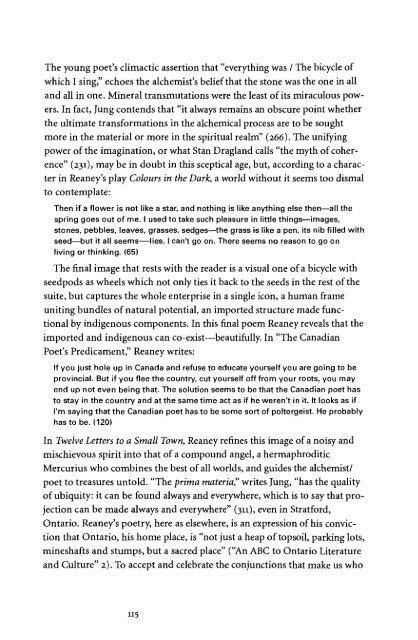Jean Rivard - University of British Columbia
Jean Rivard - University of British Columbia
Jean Rivard - University of British Columbia
Create successful ePaper yourself
Turn your PDF publications into a flip-book with our unique Google optimized e-Paper software.
The young poet's climactic assertion that "everything was / The bicycle <strong>of</strong><br />
which I sing," echoes the alchemist's belief that the stone was the one in all<br />
and all in one. Mineral transmutations were the least <strong>of</strong> its miraculous powers.<br />
In fact, lung contends that "it always remains an obscure point whether<br />
the ultimate transformations in the alchemical process are to be sought<br />
more in the material or more in the spiritual realm" (266). The unifying<br />
power <strong>of</strong> the imagination, or what Stan Dragland calls "the myth <strong>of</strong> coherence"<br />
(231), may be in doubt in this sceptical age, but, according to a character<br />
in Reaney's play Colours in the Dark, a world without it seems too dismal<br />
to contemplate:<br />
Then if a flower is not like a star, and nothing is like anything else then—all the<br />
spring goes out <strong>of</strong> me. I used to take such pleasure in little things—images,<br />
stones, pebbles, leaves, grasses, sedges—the grass is like a pen, its nib filled with<br />
seed—but it all seems—lies. I can't go on. There seems no reason to go on<br />
living or thinking. (65)<br />
The final image that rests with the reader is a visual one <strong>of</strong> a bicycle with<br />
seedpods as wheels which not only ties it back to the seeds in the rest <strong>of</strong> the<br />
suite, but captures the whole enterprise in a single icon, a human frame<br />
uniting bundles <strong>of</strong> natural potential, an imported structure made functional<br />
by indigenous components. In this final poem Reaney reveals that the<br />
imported and indigenous can со-exist—beautifully. In "The Canadian<br />
Poet's Predicament," Reaney writes:<br />
If you just hole up in Canada and refuse to educate yourself you are going to be<br />
provincial. But if you flee the country, cut yourself <strong>of</strong>f from your roots, you may<br />
end up not even being that. The solution seems to be that the Canadian poet has<br />
to stay in the country and at the same time act as if he weren't in it. It looks as if<br />
I'm saying that the Canadian poet has to be some sort <strong>of</strong> poltergeist. He probably<br />
has to be. (120)<br />
In Twelve Letters to a Small Town, Reaney refines this image <strong>of</strong> a noisy and<br />
mischievous spirit into that <strong>of</strong> a compound angel, a hermaphroditic<br />
Mercurius who combines the best <strong>of</strong> all worlds, and guides the alchemist/<br />
poet to treasures untold. "The prima materia," writes lung, "has the quality<br />
<strong>of</strong> ubiquity: it can be found always and everywhere, which is to say that projection<br />
can be made always and everywhere" (311), even in Stratford,<br />
Ontario. Reaney's poetry, here as elsewhere, is an expression <strong>of</strong> his conviction<br />
that Ontario, his home place, is "not just a heap <strong>of</strong> topsoil, parking lots,<br />
mineshafts and stumps, but a sacred place" ("An ABC to Ontario Literature<br />
and Culture" 2). To accept and celebrate the conjunctions that make us who<br />
115

















